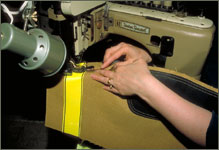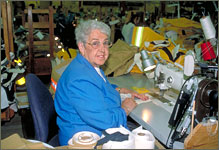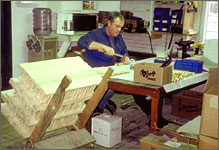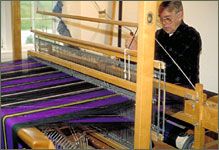Occupational Traditions – Industry & Business & Community
Two Case Studies: Harrisville Designs & Globe Firefighting Suits
During the last century many businesses in New Hampshire became successful by making things that filled a need in people's lives. Some of these businesses became an important force in a community, employing local people and contributing resources to community life. In order to stay competitive in the market place, many businesses have modified their inventories and updated their equipment. Luckily, as times have changed in New Hampshire, some companies have not changed the value they place on employees, their families, and community heritage. Here are two examples:
Globe Firefighting Suits, Pittsfield, NH
Firefighting in New Hampshire is mostly a volunteer-based service. Full time firefighters and volunteers alike depend upon excellent protective gear, most of which is made by a New Hampshire company – Globe Firefighting Suits. Globe was founded in 1868 by the Freese family and has been under family ownership ever since. Their employees live and work in the surrounding area and there is little turn over in the work force.
Today, Globe Firefighting Suits is the largest manufacturer of firefighting suits in the United States. The basic protective clothing for firefighters has not changed in many years – a heavy coat and a pair of pants are the basics. New innovations include state-of-the-art fabrics and computer tracking of each garment to assure proper matching of components. Firefighting suits have an inner thermal liner, a middle moisture barrier, and an outer shell made of fire-retardant fabric. Each garment goes through a series of workstations and each person takes pride in making sure each step of the process is done with perfection. Behind all the courageous firefighters who enter the raging chaos of a fire is the careful work of the men and women who make their gear.

Every seam of the firefighting suits
is sewn by precision craftsmen
using precision machinery.

Over the years, Polly Pinkham
has worked at every type of job
in Globe Firefighting Suits
Harrisville Designs, Harrisville, NH
From the late 1700s to the mid-1970s, the rivers of New Hampshire supported many water-powered textile mills, most specializing in the production of woolen fabrics. Over the years, several changes in the US economy have contributed to the decline in the mills in New England-the growth of the cotton industry in the South, the Civil War, the fashion industry's transition to double knits, and most recently the loss of manufacturing to other countries.
While many mill workers shifted occupations, others sought creative ways to preserve the industry. In 1972, John and Pat Colony purchased an old mill building in Harriville, New Hampshire and started Harrisville Designs. They have built upon the textile heritage of the mills and now produce spun woolen yarn, handmade looms for home use, and other weaving equipment. Many other concerned citizens joined in the effort to preserve the historic character of Harrisville, and today the town is registered as a National Historic Landmark, recognized as the only textile village of the late 1700s in the United States that survives in its original form.

Harrisville Designs carries on
a textile tradition by making
spun wool and weaving
equipment such as
peg and floor looms
for schools and home use.

Rob Roy Rob weaves
the New Hampshire tartan
pattern with spun wool.
New Hampshire State Council on the Arts
19 Pillsbury Street - 1st Floor, Concord, NH 03301


